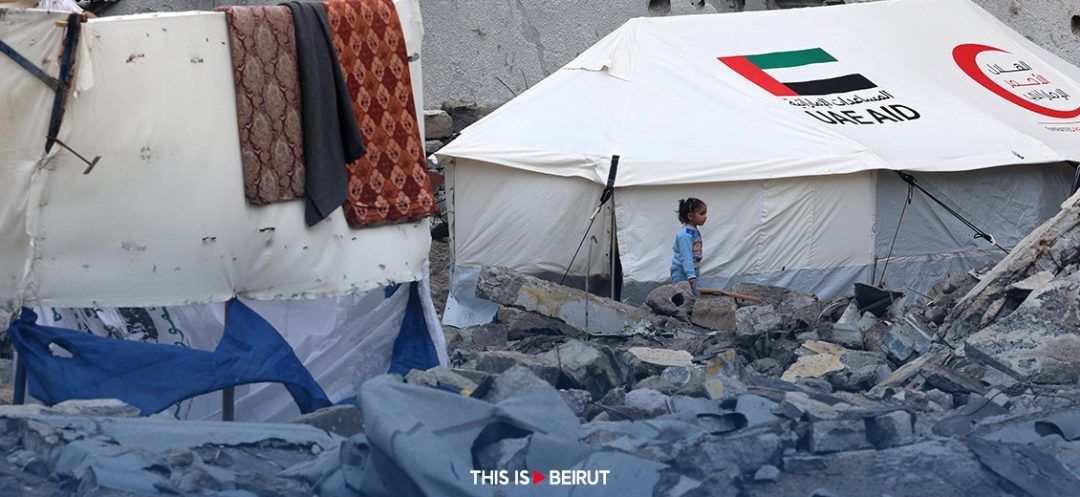- Home
- War in the Middle East
- The Dilemmas of Open-Ended Conflicts

The most intriguing feature of this war is its mutating complexion and overlapping dynamics drawing on the open-ended conflicts of an imploded Middle East. The strategic overstretch of Iranian power politics seems boundless and puts at stake the future of peace in the region. Far from being circumscribed to Gaza, this conflict questions the future of Middle Eastern geopolitics and the likelihood of conflict resolution. The unleashed violence raises thorny issues and questions the ability to address them while avoiding the pitfalls of protracted conflicts and their nihilistic propensities.
Is it possible to finish off the war in Gaza without defeating Hamas? Is it possible to avoid a full-fledged confrontation in Lebanon without disarming Hezbollah, recovering Lebanese sovereignty and implementing the 1701 UN resolution? Is it possible to engage Iran diplomatically without putting an end to its ability and determination to disrupt the regional order, sabotage the international maritime pathways on the Red Sea, pursue its nuclear militarization, broadcast its annihilation objectives towards Israel and catalyze destabilization strategies throughout the Middle East? The Iranian regime is instrumenting proxy wars and low-intensity conflicts, while diligently undermining civil concord all across the Middle East.
The Iranian strategy is unlikely to be deciphered unless we understand the nexus between the survival of a highly controversial regime, the unraveling of international and regional orders and the politics of active destabilization and open conflicts. The gradual takeover of four major countries and proto-national entities in the Near East (Irak, Syria, Lebanon, Gaza and the Palestinian Territories) and the Southern end of the Arabian peninsula, the instrumentalization of civil wars and terrorist movements and the active engagement of the new Cold War shifting coalitions are essential if we were to come to terms with the politics of subversion operating all across the region.
Is it possible to put an end to the war in Gaza without defeating Hamas, and addressing the critical issues of alternative governance which brings back to the forefront the overall solution to the Israeli-Palestinian conflict? Aside from the critical security issues unveiled in the aftermath of October 7th, 2023, is it realistic to set aside the emergency of an international conference that brings back both parties to the table to finalize the pending issues bequeathed by 7 decades of negotiations? It’s impossible, from now on, to consider the interlocked issues and deal with them separately, as if they were unrelated to each other. The defeat of Hamas is the prelude to renewed negotiations between the Israelis and the Palestinian authority. Hamas and its acolytes have doomed themselves, and they can never claim any legitimacy since they utterly failed their criminal military undertaking, demonstrated their moral depravation and moral callousness towards the civilian population in Gaza, and cannot formally request their participation in the eventual peace deliberations. The restoration of the status quo ante is nonsensical and urges the conflicting parties to prepare the future scenarios of deconfliction and peacemaking.
The Lebanese operational theater brings us back to the aporias of Lebanese sovereignty and its discretionary instrumentalization by regional power politics, over the last six decades, and its disastrous consequences. Israel is categorically opposed to the actual state of affairs, whereby Hezbollah and its partners shelter behind the sham of Lebanese Statehood to undermine Israeli national security. The ensuing dilemmas are the following: 1/ the ability of the Lebanese State to restore its national sovereignty, and put an end to the legal and political extraterritoriality and status usurpation instrumented by Shiite extremists and their acolytes; 2/ the reinstatement of a security zone larger than the one of the eighties (1985-2000, 900 Km2= 350 miles); 3/ the implementation of the international resolutions (1559, 1680, 1701, 2695) which stipulate the restoration of Lebanese sovereignty, the disarmament of militias and more specifically Hezbollah and the Palestinian camps, the full control of the Lebanese army, and the exclusivity of the UN peacekeeping mission…
Observers of the Lebanese political scenery are quite wary about the readiness of Hezbollah to abide by the mandates of Lebanese sovereignty and the international resolutions and security mandates. These basic observations reflect the quandaries of national sovereignty, neo-imperial politics in the Middle East and the viability of the extant geopolitics challenged by Iranian and Turkish power politics and Islamist terror movements. Short of an overall political agreement between the US, its allies and Iran, the State of Israel is unwilling to condone the state of affairs and deal with the lingering ambiguities of Lebanese sovereignty and its security hazards.
The challenges to maritime security highlighted lately the menaces of Houthi proxies and their incidence on international trade security. The strategic threats are heightened and their incidence on global security question the international treaties, the UN charts and their inherent rules of civility. The US coalition's retaliatory attacks are meant to draw the demarcation line, dissuade the repeated violations of international law and seafarer security, and reaffirm the primacy of diplomacy and peaceful conflict resolution. The Iranians are not willing, so far, to normalize and engage the international community rules.
The structural fragility of the Iranian regime is a major impediment to normalization and accounts for the interrelated politics of internal repression and regional destabilization. The Iranian politics made up of brigandage, nuclear militarization, international terrorism and a criminal economy cannot sustain the mandated course of normalization and will inevitably lead to war. The international community, Western and Arab regimes cannot adjust to the shifting priorities of the Iranian subversion strategy navigating the murky waters of international terrorism, organized criminality and widespread civil wars, and claiming not to erode the foundations of international peace. This ambiguity is coming to an end, either by inviting war or seeking peace.



Comments